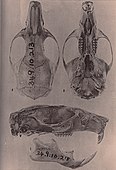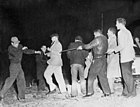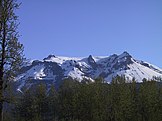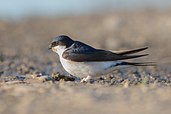| << | Today's featured articles for January 2022 | >> | ||||
|---|---|---|---|---|---|---|
| Su | Mo | Tu | We | Th | Fr | Sa |
| 1 | ||||||
| 2 | 3 | 4 | 5 | 6 | 7 | 8 |
| 9 | 10 | 11 | 12 | 13 | 14 | 15 |
| 16 | 17 | 18 | 19 | 20 | 21 | 22 |
| 23 | 24 | 25 | 26 | 27 | 28 | 29 |
| 30 | 31 | |||||
January 1
The black-and-red broadbill (Cymbirhynchus macrorhynchos) is a bird in the Asian broadbill family that is found in Indochina, Sumatra, and Borneo. It is the only species in the genus Cymbirhynchus. It inhabits lowland forests near water, along with disturbed habitats and secondary forests. A large and distinctive bird, it has maroon underparts, black upperparts, and a maroon neck-band, along with a blue and yellow beak. Females are slightly smaller than males. It feeds on insects, fish, mollusks, snails, and crustaceans. It breeds in the dry season, building a large and conspicuous nest over water. Clutches usually have two or three eggs, but sometimes will have a fourth runt egg, and are incubated by both sexes, hatching in twenty-one days. Due to its extensive range and large population, the black-and-red broadbill is evaluated as a least-concern species by the IUCN. They are threatened by deforestation, trapping for the songbird trade, and hunting. (Full article...)
January 2
Seventy-Six is a historical fiction novel by American writer John Neal (pictured). Published in Baltimore in 1823, it is the fourth novel written about the American Revolutionary War. Historically distinguished for its pioneering use of colloquial language, the Yankee dialect, battle scene realism, high characterization, stream of consciousness narrative, profanity, and depictions of sex and romance, the novel foreshadowed and influenced later American fiction. With narrative prose that resembles spoken American English more than any other period literature, it was the first work of American fiction to use the phrase son-of-a-bitch. It explores male pain and self-loathing resulting from violent acts committed in war and duels. Inspired by his own historical research, Neal took only twenty-seven days to write the 528-page novel, reporting that "I tumbled out of my chair" because "I had fainted, – swooned, – from overwork." (Full article...)
January 3
The 2008 Orange Bowl was a bowl game between the college football teams Virginia Tech Hokies and Kansas Jayhawks on January 3, 2008, at Dolphin Stadium in Miami Gardens, Florida. Tech was favored, but Kansas won 24–21 in a game dominated by defense. The Orange Bowl, part of the 2007–08 Bowl Championship Series, was the final game for both teams and was watched by more than eight million FOX viewers in the US. Tech qualified by being the ACC champion, while Big 12 team Kansas was selected by the Orange Bowl. Tech was designated as the home team at the neutral venue. This was the first Orange Bowl appearance for Kansas since 1969 and for Tech since 1996. Todd Reesing, quarterback for Kansas, completed 20 of his 37 passes for 227 yards, a touchdown, and an interception, and Tech quarterback Sean Glennon had 13 for 28 passing, earning 160 yards, one touchdown and two interceptions. Kansas cornerback Aqib Talib scored with an interception touchdown and won the Most Valuable Player award. (Full article...)
January 4
The 1st Missouri Field Battery was a battery of field artillery that served in the Confederate States Army during the American Civil War. The battery was formed by Captain Westley F. Roberts in Arkansas in September 1862 and was armed with two 12-pounder James rifles and two 6-pounder smoothbore guns (example pictured). The unit fought in numerous actions in the Trans-Mississippi Theater in 1862–1864. In December 1863, it received new cannons: two 10-pounder Parrott rifles and two 12-pounder howitzers. On April 30, 1864, while part of a Confederate force pursuing a retreating Union army, several of the cannons were captured at the Battle of Jenkins' Ferry. The battery was then rearmed with four 6-pounder smoothbores. In November 1864, the unit was designated the 1st Missouri Field Battery. It was paroled on June 7, 1865, at Alexandria, Louisiana, after Confederate general and Trans-Mississippi Department commander Edmund Kirby Smith signed surrender terms for the department on June 2. (Full article...)
January 5
Symphyotrichum lateriflorum, the calico or starved aster, is a perennial plant in the family Asteraceae found in North America. Its flowers are small, at about 13 millimeters (0.51 in) in diameter when in full bloom. It has seven to fifteen white ray florets that surround a group of about eight to sixteen cream to light yellow disk florets. After pollination, the disk florets may turn pink, then purple or light brown. Its late-summer and fall flowers are visited by small pollinators and nectar-seeking insects such as sweat bees, miner bees, and hoverflies. The leaves have fine veins and little to no hair except for the key characteristic of hair on the back midrib. The plant was first described by Carl Linnaeus in 1753 as Solidago lateriflora. The Meskwaki and Potawatomi have used the plant medicinally and in sweatbaths. It was cultivated in Europe by 1758, and modern-day cultivars include 'Bleke Bet', 'Lady in Black', and 'Prince'. (Full article...)
January 6
Cardiff City beat Leeds United 2–1 in their third-round 2001–02 FA Cup football match at Ninian Park (pictured) in Cardiff on 6 January 2002. Premier League Leeds United were favourites as Cardiff City were tenth in the Second Division, two tiers below. As a Premier League team, Leeds entered the FA Cup in this round, while Cardiff had had to win two earlier matches. The gate was more than 22,000, a record at Ninian Park that season. Andy D'Urso was the referee. Leeds scored in the 12th minute via a goal from Mark Viduka. Cardiff equalised soon after with Graham Kavanagh scoring from a free-kick. Shortly before half-time, Leeds midfielder Alan Smith was sent off after clashing with Cardiff's Andy Legg, so Leeds had to play defensively in the second half. With three minutes remaining, Scott Young volleyed in the winning goal. Cardiff fans invaded the pitch and clashes between the two sets of supporters led to police intervention. Cardiff were eventually fined £20,000 for the pitch invasion. (Full article...)
January 7
Hammond's rice rat (Mindomys hammondi), also known as Hammond's oryzomys, is a species of rodent in the tribe Oryzomyini of family Cricetidae. Formerly considered to be related with Nectomys, Sigmodontomys, Megalomys, or Oryzomys, it is now placed in its own genus, Mindomys, but its relationships remain obscure; some evidence supports a placement near Oecomys or as a basal member of Oryzomyini. Mindomys hammondi is known only from Ecuador, where it occurs in montane forest; a record from the Amazon basin lowlands is dubious. Reportedly, it lives on the ground and is associated with water; others suggest it lives in trees. A large, long-tailed, and long-whiskered rat, its fur is buff above and abruptly lighter below. The front part of the skull (rostrum) is heavily built. The species is named after the collector who first found it, Gilbert Hammond. He supplied natural history specimens to Oldfield Thomas and others. (Full article...)
January 8
The Missouri Centennial half dollar is a commemorative fifty-cent piece struck by the United States Bureau of the Mint in 1921. It was designed by Robert Ingersoll Aitken. The U.S. state of Missouri wanted a commemorative coin to mark its centennial that year. Authorizing legislation passed through Congress without opposition, and was signed on March 4, 1921, by President Warren G. Harding on his inauguration day. The federal Commission of Fine Arts hired Aitken to design the coin, which depicted Daniel Boone on both sides. The reverse design, showing Boone with a Native American, was likely intended to symbolize the displacement of the Indians by white settlers. To increase sales, a portion of the issue was produced with the mark "2★4", symbolic of Missouri being the 24th state. Although admired for the design, the coins did not sell as well as hoped, and almost 60 percent were returned to the Philadelphia Mint for melting. (Full article...)
January 9
The Power Mac G4 Cube is a personal computer of the Macintosh family sold by Apple from July 2000 to 2001. It was designed by Jonathan Ive and conceived by CEO Steve Jobs as a powerful, miniaturized desktop computer. Apple developed new technologies and manufacturing methods for its 7.7-inch (20 cm) cubic computer housed in clear acrylic glass. The Cube was mid-range, between the consumer iMac G3 and the professional Power Mac G4. It was announced at the Macworld Expo on July 19, 2000. It won awards for its design, but reviews noted the high cost for its power, its limited expandability, and cosmetic defects. It was a commercial failure, selling just 150,000 units before production ended within a year. The Cube was a rare failure for the company under Jobs, after a successful period that brought the company back from the brink of bankruptcy. However, it influenced future Apple products, from the iPod to the Mac mini. New York's Museum of Modern Art holds a G4 Cube as part of its collection. (Full article...)
January 10
Ursa Minor (Little Bear) is a constellation in the northern sky. In North America, it is also known as the Little Dipper since its seven main stars appear to form a ladle shape (diagram pictured). One of 88 modern constellations, it was also one of 48 listed by 2nd-century astronomer Ptolemy. Polaris, its brightest star, is currently less than one degree away from the north celestial pole. Because this position stays nearly fixed as the Earth rotates, the star has been important for navigation, particularly by mariners. Polaris is a yellow-white supergiant and the brightest Cepheid variable star, ranging in apparent magnitude (m) from 1.97 to 2.00. Beta Ursae Minoris, also known as Kochab, has swollen and cooled to become an orange giant with a slightly fainter m of 2.08. Ursa Minor also contains an isolated neutron star—Calvera—and H1504+65, the hottest known white dwarf, with a surface temperature of 200,000 K. Planets have been detected orbiting four of its stars, including Kochab. (Full article...)
January 11
The Croatian Spring was a political conflict that took place from 1967 to 1971 in the Socialist Republic of Croatia, at the time one of six republics comprising Yugoslavia and ruled by the League of Communists of Croatia (SKH). It was marked by a series of economic reforms. Reformers within the SKH, aligned with the Croatian cultural society Matica hrvatska, came into conflict with conservatives. A variety of grievances were aired, including demands for increased autonomy, opposition to real or perceived overrepresentation of Croatian Serbs in Croatia and disagreement over whether the Croatian language was distinct from Serbo-Croatian. The conflict also increased the popularity of expressions of Croatian culture. Plans were made to amend the constitution. The Yugoslav leadership intervened, compelling the SKH leadership to resign (headline pictured). Nevertheless, most demands were later adopted, ushering in a form of federalism that contributed to the subsequent breakup of Yugoslavia. (Full article...)
January 12
Mu'awiya I (c. 600 – 680) was the founder and first caliph of the Umayyad Caliphate, serving from 661 until his death. He acceded less than thirty years after the Islamic prophet Muhammad's death and shortly after the four Rashidun caliphs. He embraced Islam after Muhammad's conquest of Mecca in 630. Afterward, Mu'awiya became one of his scribes and, by the 640s, the governor of Syria. After Caliph Uthman was assassinated in 656, Mu'awiya opposed his successor, Ali. They fought to a stalemate during the First Muslim Civil War. When Ali was assassinated in 661, Mu'awiya compelled Ali's son Hasan to abdicate. As caliph, Mu'awiya relied on his Syrian supporters and conferred autonomy to the provinces. He fought the Byzantines throughout his reign, and renewed the Muslim conquests. His controversial appointment of his son Yazid I as successor introduced dynastic rule to Islamic politics. Mu'awiya is honored by Sunni Muslims as a companion of Muhammad, but reviled by Shia Muslims for opposing Ali. (Full article...)
January 13
Blakeney Chapel is a ruined building on the Norfolk coast of England. Despite its name, it is in the parish of Cley next the Sea, not the adjoining village of Blakeney, and was probably not a chapel. The building stood on a mound or "eye" (pictured) on the seaward end of the coastal marshes, less than 200 m (220 yd) from the sea and just north of the current channel of the River Glaven where it turns to run parallel to the shoreline. It consisted of two rectangular rooms of unequal size, and appears to be intact in a 1586 map. Only the foundations and part of a wall still remain. A small hearth, probably used for smelting iron, is the only evidence of a specific activity. Much of the structural material was reused in nearby buildings long ago. The ruins are protected as a scheduled monument and Grade II listed building due to their historical importance, but are not actively managed. A realignment of the Glaven's course through the marshes accelerated the ruins' likely loss to the sea. (Full article...)
January 14
Low is the 11th studio album by the English musician David Bowie, released on 14 January 1977 by RCA Records. Grounded in art rock and experimental rock, Low features Bowie's first explorations in electronic and ambient styles. Recording sessions began at Château d'Hérouville in northern France in September 1976 and ended in October at Hansa Studios in West Berlin. The cover artwork, a profile of Bowie from the film The Man Who Fell to Earth (1976), was intended as a visual pun, meaning "low profile". RCA refused to issue Low for three months, fearing it would be a commercial failure. Upon release, it divided critical opinion and received little promotion from either RCA or Bowie. Nevertheless, the album reached number two in the UK and number eleven in the US. Two singles were released: "Sound and Vision" and "Be My Wife". In later decades, critics have rated Low one of Bowie's best works, and it has appeared on several lists of the greatest albums of all time. (Full article...)
January 15
The Trundle is a hillfort from the Iron Age on St Roche's Hill, north of Chichester, England. It is built on the site of a causewayed enclosure, a form of early Neolithic earthwork. Causewayed enclosures were built in England from shortly before 3700 BC until about 3300 BC; their purpose is not known. A chapel dedicated to St Roche was built on the hill around the end of the 14th century; it was in ruins by 1570. The hillfort is still a substantial earthwork (pictured), but the Neolithic site was unknown until 1925. Causewayed enclosures were new to archaeology at the time and an aerial photograph persuaded archaeologist E. Cecil Curwen to excavate the site in 1928 and 1930. These early digs established a construction date of about 500 BC to 100 BC for the hillfort, and proved the existence of the Neolithic site. In 2011 the Gathering Time project used radiocarbon dating to conclude that the Neolithic part of the site was probably constructed no earlier than the mid–4th millennium BC. (Full article...)
January 16

Ghostbusters is a 1984 American supernatural comedy film directed and produced by Ivan Reitman and written by Dan Aykroyd and Harold Ramis. The comedy film stars Bill Murray, Aykroyd, and Ramis as a trio of eccentric parapsychologists who start a ghost-catching business in New York City. It also stars Sigourney Weaver (pictured) and Rick Moranis, and features Annie Potts, William Atherton, and Ernie Hudson in supporting roles. Ghostbusters was released on June 8, 1984, to critical acclaim, with Murray's performance often praised, and became a cultural phenomenon. The film earned $282.2 million during its initial run, making it the second-highest-grossing film of 1984 in the United States and Canada, and the then–highest-grossing comedy ever. In 2015, the Library of Congress selected it for preservation in the National Film Registry. With a dedicated fan following, the film's success launched a multi-billion dollar multimedia franchise, including sequels, television series, video games, and a reboot of the original. (Full article...)
January 17
Chinatown MRT station is an underground Mass Rapid Transit (MRT) interchange on the North East line (NEL) and Downtown line (DTL) in Outram, Singapore. It is located near landmarks such as the Buddha Tooth Relic Temple and Museum, Masjid Jamae (Chulia), Chinatown Point and People's Park Complex. Announced in 1996 and completed in 2003, the NEL station was one of the most challenging projects during that line's construction, requiring diversion of roads, and preservation of the Garden Bridge. In 2007, an interchange with the DTL at this station was announced. The DTL platforms opened in 2013. Each of the six entrances has glass structures, with the Pagoda Street entrance having a pavilion-style transparent roof structure (pictured) and the DTL entrance having an elliptical shape. The NEL concourse and platforms feature calligraphy as part of The Phoenix's-Eye Domain by Tan Swie Hian, while the DTL concourse walls feature artworks of clothes lines as part of Flying Colours by Cheo Chai Hiang. (Full article...)
January 18
The Battle of Hayes Pond was an armed confrontation between members of a Ku Klux Klan organization and Native Americans of the Lumbee Tribe at a Klan rally near Maxton, North Carolina, on the night of January 18, 1958. The rally was planned by Klan leader James W. "Catfish" Cole who sought to uphold racial segregation in Robeson County. Cole hoped his gathering would have a large turnout and widely advertised it, infuriating the Lumbee community. On the night of the rally, hundreds of Lumbees, many armed, encircled the Klansmen in the field at Hayes Pond where they had assembled. After an altercation in which the single light in the field was destroyed, the Lumbees began firing their weapons and most of the Klansmen fled. The Lumbees then seized Klan regalia before police restored order. Afterwards, Cole was convicted for inciting a riot. The event was widely covered in the local and national press. (Full article...)
January 19
Hoodoo Mountain is a potentially active stratovolcano in the Northern Interior of British Columbia, Canada. Its flat-topped summit is covered by an ice cap that is more than 100 metres (330 feet) thick and at least 3 kilometres (2 miles) in diameter, and has an elevation of 1,850 metres (6,070 feet). The primary rock types comprising the volcano are phonolite and trachyte, which were deposited during six periods of eruptive activity beginning about 85,000 years ago. There was at least one period of explosive activity. The latest eruptive period began around 10,000 years ago. A lava flow covering the southwestern slope may have been produced within the last few hundred years. There have been periods of seismic activity since at least the mid-1980s, indicating possible future eruptions. Two valley glaciers on the sides of the mountain have retreated significantly over the last hundred years. The closest communities are more than 30 kilometres (20 miles) away. (Full article...)
January 20
The Old Exe Bridge is a ruined medieval bridge in Exeter, England. Built from around 1190 and completed by 1214, it is the oldest surviving bridge of its size in England and the oldest bridge in Britain with a chapel on it. The project was the idea of influential local merchants Nicholas and Walter Gervase, father and son. The bridge was at least 590 feet (180 metres) long and probably had 17 or 18 arches, carrying the road across the flood plain of the River Exe. St Edmund's Church, the bridge chapel, was built into the bridge at the time of its construction. Later all but the central section carried buildings. The bridge collapsed and had to be partially rebuilt several times but remained in use for almost 600 years, until a replacement was built in 1778 and the arches across the river were demolished. In 1969 eight and a half arches of the medieval bridge were uncovered and restored. The bridge's remains are a scheduled monument and a Grade II listed building. (Full article...)
January 21
The Schichau class consisted of 22 torpedo boats built for the Austro-Hungarian Navy between 1885 and 1891. Initially powered by steam from a locomotive boiler and armed with two 37 mm (1.5 in) Hotchkiss guns and two 356 mm (14 in) torpedo tubes, they all received two Yarrow boilers and a second funnel between 1900 and 1910. Ten were converted into minesweepers between 1911 and 1913. One boat was discarded in 1911 and the rest saw active service as part of local defence forces for Adriatic naval bases during World War I. The nine torpedo boats which survived were also converted into minesweepers in 1917. After the war, sixteen of the boats were allocated to Italy and four to the Royal Yugoslav Navy. All of the boats had been discarded by 1929 except for one Yugoslav vessel. Captured during the 1941 Axis invasion of Yugoslavia, it served with the Italians and later the Germans. It was lost sometime after September 1943. (This article is part of a featured topic: Ships of the Royal Yugoslav Navy.)
January 22
Legend Entertainment Company was an American developer and publisher of computer games, best known for creating adventure titles throughout the 1990s. The company was founded by Bob Bates (pictured) and Mike Verdu. Legend also negotiated licenses to popular book series and earned a reputation for comedic adventures. Industry changes led to increased competition by the mid-1990s and expenses for graphics rose without a similar increase in sales. As a result Legend outsourced marketing and distribution and focused on development. While the studio's adventure titles suffered, working with game publishers allowed it to experiment with more action-oriented titles. Legend fully pivoted to first-person shooters thanks to a relationship with Unreal developer Tim Sweeney and an acquisition by publisher GT Interactive. Sales continued to dwindle, followed by the commercial failure of Unreal II: The Awakening in 2003. The studio was shut down in January 2004, with staff moving to other game companies. (Full article...)
January 23
Archaeoindris fontoynontii is a gorilla-sized extinct giant lemur, the largest primate known from Madagascar. This sloth lemur was related to the extinct Palaeopropithecus and became extinct around 350 BCE. It was first described by Herbert F. Standing in 1909 based on subfossil jaw fragments, although a complete skull was later found. Only six bones from the lower skeleton have been located. The skeleton was massive and the arms were longer than the legs, but no hand or foot bones are known. Size estimates range as high as 244.1 kilograms (538.1 pounds), but regression analyses predict a mass of 160 kg (350 lb). Misattributions and limited remains have resulted in differing opinions about how this lemur moved. Its skeleton suggests it was a climber that also travelled on the ground. Its diet was mostly leaves, and its former habitat, a mix of woodlands and savanna, is now mainly grassland. When humans arrived on Madagascar, it was still extant but vulnerable to hunting and habitat loss. (Full article...)
January 24
The New York Stock Exchange Building is the headquarters of the New York Stock Exchange (NYSE). It is composed of two connected structures in Lower Manhattan, New York City. One part, the original structure at 18 Broad Street, was designed in the Classical Revival style by George B. Post; the other is a 23-story office annex at 11 Wall Street, designed by Trowbridge & Livingston in a similar style. The NYSE had occupied the site on Broad Street since 1865 but had to expand its previous building several times, and so the structure at 18 Broad Street was erected between 1901 and 1903. Within two decades, the new building had become overcrowded, and the annex at 11 Wall Street was added between 1920 and 1922. The original structure's colonnade is an icon of the NYSE; behind it is the main trading floor, a 72-foot-tall (22 m) rectangular space. The building was designated a National Historic Landmark in 1978 and a city landmark by the New York City Landmarks Preservation Commission in 1985. (Full article...)
January 25
The Symphony No. 4 in G major by Gustav Mahler was composed from 1899 to 1900, incorporating a song that he wrote in 1892. That song, "Das himmlische Leben", presents a child's vision of heaven and is sung by a soprano in the symphony's fourth and final movement. The Fourth Symphony was both smaller in orchestration and shorter in length than Mahler's earlier symphonies. The premiere was performed in Munich on 25 November 1901 by the Kaim Orchestra conducted by the composer. It was met with negative audience and critical reception over the work's confusing intentions and perceived inferiority to the Second Symphony. The work received its American and British premieres in 1904 and 1905, respectively. After Mahler's death, the symphony continued to receive performances under conductors such as Willem Mengelberg and Bruno Walter. Its first recording was a 1930 Japanese rendition conducted by Hidemaro Konoye that was also the first electrical recording of any Mahler symphony. (Full article...)
January 26

The Australian Air Corps (AAC) was a temporary military formation that existed in the interval between the disbandment of the Australian Flying Corps (AFC) of World War I and the establishment of the Royal Australian Air Force (RAAF) in March 1921. Raised in January 1920, the AAC was commanded by Major William Anderson, a former AFC pilot. Many members of the AAC were also from the AFC and went on to join the RAAF. Although part of the Australian Army, the AAC was overseen by a board of senior officers that included members of the Royal Australian Navy. The primary purpose of the corps was to maintain assets of the Central Flying School at Point Cook, Victoria, but it also undertook several pioneering activities: AAC personnel set an Australian altitude record that stood for a decade, made the first non-stop flight between Sydney and Melbourne, and took the country's initial steps in the field of aviation medicine. The RAAF inherited Point Cook and most of its initial equipment from the AAC. (Full article...)
January 27
The Ba Congress was a meeting of representatives of the Chetnik movement led by Draža Mihailović (pictured) between 25 and 28 January 1944 in the village of Ba in German-occupied Serbia during World War II. The congress advanced a political alternative to the communist-led Anti-Fascist Council for the National Liberation of Yugoslavia (AVNOJ) of the Yugoslav Partisans. In December 1943, the major Allied powers had decided to provide their exclusive support to the Partisans and withdraw support from the Chetniks, as they had concluded that the Chetniks were more interested in collaborating with the Axis powers against the Partisans than fighting the Axis. The congress denounced the decisions of the AVNOJ, re-asserted its full support for the Yugoslav government-in-exile and opposition to the Axis, and proposed a Serb-centric vision for the political and socio-economic future of Yugoslavia. However, with the Allied policy change, nothing could be done to improve the position of the movement. (Full article...)
January 28
The Space Shuttle Challenger disaster occurred on January 28, 1986, killing all seven crew members aboard. Challenger disintegrated over the Atlantic Ocean, off Cape Canaveral, Florida, at 11:39 a.m. EST (16:39 UTC), 73 seconds into its flight. The disaster was caused by the failure of the two O-ring seals in a joint in the Space Shuttle's right solid rocket booster in record-low temperatures. Several crew members are known to have survived the initial breakup of the spacecraft, but the impact of the crew compartment at terminal velocity with the ocean surface was too violent to be survivable, and the orbiter had no escape system. President Ronald Reagan created the Rogers Commission to investigate the accident; it criticized NASA's organizational culture and decision-making processes that had contributed to the accident. There was a 32-month hiatus in the Space Shuttle program. To replace Challenger, the construction of Endeavour was approved in 1987, and the new orbiter first flew in 1992. (Full article...)
January 29
A Beautiful Crime is a 2020 crime fiction novel by the American writer and editor Christopher Bollen (pictured). It was first published in the United States by Harper on January 28, 2020. The story, which is set in Venice, centers on boyfriends Nick and Clay, who sell an inherited collection of forged silver antiques to a wealthy acquaintance from Clay's past. Their deception quickly leads to more serious crimes, as Clay attempts to sell an expensive property that he does not fully own and Nick murders a silver appraiser who threatened to expose their sale of forgeries. The novel explores the overtourism and depopulation of Venice, and the intersection of greed, moral ambiguity, and social inequality. Critics praised Bollen's depictions of Venice and the relationships between the characters but disagreed on the effectiveness of the narrative's pace. A Beautiful Crime has drawn comparisons to novels by Patricia Highsmith, particularly The Talented Mr. Ripley (1955). (Full article...)
January 30
Benedetto Pistrucci (1783–1855) was an Italian gem-engraver, medallist and coin engraver, probably best known for his design of Saint George and the Dragon for the British sovereign coin. Born in Rome, he became prominent as a cameo carver. In 1815, he moved to Britain, where he would live for most of the rest of his life. His talent brought him to the attention of William Wellesley-Pole, Master of the Mint. Pole engaged Pistrucci to design new coinage, including the sovereign, which was first issued in 1817 to mixed reactions. In 1819 he was commissioned to create the Waterloo Medal, a huge piece some 5.3 inches (130 mm) in diameter that the British government planned to award to the generals and national leaders who had defeated Napoleon. He took thirty years to complete the design, but because of the coin's great size it could not be struck. After Pistrucci's death, the George and Dragon design was restored to the sovereign coin, and is still used today. (Full article...)
January 31
Delichon is a genus of birds in the swallow family containing four species named as house martins. These are chunky, bull-headed and short-tailed birds, blackish-blue above, with a white rump and white or grey underparts. They have feathering on their toes and tarsi. They breed in Europe, Asia and the mountains of North Africa. The common (example pictured), Siberian and Asian house martins all migrate south in winter, while the Nepal house martin is resident in the Himalayas. House martins nest in colonies on cliffs or buildings. Both parents build the lined mud nest, incubate the three or four white eggs of a typical clutch and feed the chicks. Aerial hunters of small insects, they may be caught by fast birds of prey and may carry fleas or other parasites. None of the species are considered threatened, although common house martin numbers have declined in parts of Europe due to poor weather, poisoning by pesticides and nest-site competition with house sparrows. (This article is part of a featured topic: Delichon.)




























